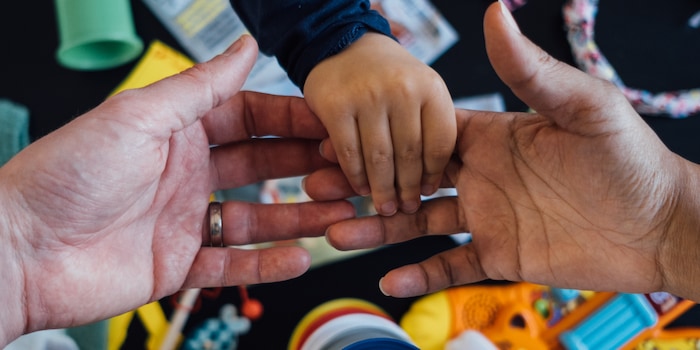
Guide
Everything about sexuality
by Natalie Hemengül

No time, no libido, no chance. When a baby arrives, sex falls by the wayside. Here, an expert explains why – and how sex dates can help.
«We had ‘parent sex’ yesterday,» Australian blogger Constance Hall wrote in a Facebook post a few years ago. «It’s that 3.5 minutes you get in between changing nappies and making food, where you notice that all of your kids are pretty distracted, where you realise it's been almost a month since you banged and are starting to feel like flatmates.» Her brutal honesty seemed to resonate with countless couples, sending her post viral.
Sexologist and psychotherapist Dania Schiftan reckons this kind of sexual scenario, although less titillating, is alright, too. At the end of the day, sex doesn’t always have to result in fireworks. In this interview, she discusses loss of desire after giving birth, sex as a means of switching off from everyday life, and the ability to grab steamy opportunities by the horns.
Dania Schiftan, how many parental beds have got nothing going on between the sheets?
Dania Schiftan: Loads of them. On the other hand, there are plenty of mums and dads who’re active in the bedroom. There are certainly couples who value having sex and really benefit from sleeping together regularly in addition to spending time with the family. For these couples, sex is a way of switching off and recharging their batteries. For others, it’s hobbies or work that put the spring back in their step. Or they prefer to unwind in the bathtub.
Quantity aside: can parents with young children still have good sex?
You might as well ask whether parents with young children can still go to a couples’ spa retreat or enjoy a dinner date without the kids. The answer to those questions is clear: of course they can. So why shouldn't they have good sex too? That said, many couples can’t transition to a post-kid sex life, because pre-kids, they never had to limit themselves in that arena. They’re used to having sex when they both feel like it and when they have time for each other. With kids, this no longer works.
For parents, having a sex life requires a different skill set: the ability to let hunger come during the meal itself.
What kind of transition do they have to make?
Having a sex life requires a new skill set; namely the ability to take advantage of opportunities when they arise, and the ability to let hunger come during the meal itself. To experience arousal when the body is touched – even if at an emotional level, not everything’s perfect at that moment. Lots of people have internalised the idea that they’ll only be physically aroused if the mood is right, or if they’re newly loved up. When you become a parent, though, this doesn’t work anymore – possibly because you’re agitated or totally exhausted. Or because you've already received a sufficient dose of love from the toddlers who’ve been clinging to you all day. Desire can evade you at first, but it can come if you put your mind to it.
Is it clichéd to say that it’s often mothers who lose their desire?
Not necessarily. Women are often the ones who’ve learned that sex is linked to positive emotions. Secondly, many women experience sex with their partner as work rather than play; for instance, because they either find it difficult to have an orgasm, or don’t have them at all. As a result, they prefer masturbation to sex.
Is body image a big factor? Many women struggle with their post-pregnancy bodies.
Definitely. Women often grow up with a distorted body image already. For them, their body is only okay if it corresponds to the ideal. If their body changes after pregnancy, they no longer feel desirable. The knock-on effect of this is that they no longer pay attention to the sensations they experience during sex. The judgemental demon of insecurity hangs over them, constantly pointing out the size of their love handles. It doesn’t even register with them that their partner doesn’t care about a bit of extra fat. The more they let themselves go and surrender to their senses, the more irrelevant this shadow hanging over them becomes.
Turning our attention to the other side of the gender divide, why might dads lose interest in sex?
This isn’t uncommon, and there can be several reasons for it. Some find their paternal role tough. Others can’t get the image of the birth out of their minds. Many also see sex as a kind of competitive sport in which they’re expected to perform. Sometimes they actually struggle to maintain an erection because their partner's vagina feels different after the birth. Or because the woman in front of them suddenly looks different from the image inside their heads. Her breasts, for example, are larger while she’s breastfeeding.

What if your sex life has been on the back burner for a long time? When does it start to become a problem?
There are couples who get it on again just two weeks after the birth. Then there are those who don’t do the deed again until a year or two has passed. There’s no right or wrong way. It turns into a problem when the couple isn’t in agreement. If one partner is unsatisfied and wants to change the situation before the other one does, things get tricky for both parties. One person, not wanting to have sex, feels pressured and bad. The other person, who wants more, feels bad because they want something that goes against their partner’s will. Passively demanding doesn't help, and neither does passively refusing.
So what does help?
The trick is to have the real conversation. Sitting down together, thinking, planning, and seriously confronting your emotions – both of your emotions, that is. The person who wants more sex has to be taken seriously, too. Having an eternal understanding for a partner’s lack of desire isn’t a solution either.
Can parents relearn sex?
Yes, absolutely. And the sex can actually end up being even better than it was before.
How do couples achieve that?
There are a lot of options. In my book «Keep it coming», I set them out in detail. The important thing is to be curious about each other again. We think we know every inch of our bodies, and yet, there’s so much we don’t know about ourselves or our partners. I also recommend showing affection outside of the bedroom. If touch isn’t just perceived as a gateway to sex, it takes away the burden of expectation. However, having any sex at all is just as important: to take advantage of opportunities when they arise instead of waiting until you both feel like it. One good option is arranging a sex date.
Sex and desire don't have to come about spontaneously. We do, after all, plan dinner dates and spa holidays in advance.
Scheduling sex sounds a bit formal. Can that really work?
Yes. Like I said, sex and desire don't have to come about spontaneously. Especially not if you have children. We do, after all, plan dinner dates and spa holidays in advance, then look forward to them. It’s the same with sex. At the same time, scheduled sex doesn't always have to be mind-blowing. It doesn't always have to be a twelve-course French meal. Sometimes it can be fast food, too.
Whether it’s fast food or a twelve-course meal: how often is often enough?
There’s no one-size-fits-all answer to that. Every couple should be able to enjoy their sexuality in whatever form it takes. Both as a means of connection, and as a resource for oneself. Whether that's once a week, once a month, or less, it doesn't matter. We tend to do things that are physically and psychologically good for us more often than things we find tedious. That should also apply to sex: it should do us good.
Dania Schiftan has been working as a sexologist and psychotherapist from her practice in Zurich for over 14 years. She’s also a psychologist at Parship. You can find out more about her in this interview:
You’ll find the rest of the articles in the series here:
Mom of Anna and Elsa, aperitif expert, group fitness fanatic, aspiring dancer and gossip lover. Often a multitasker and a person who wants it all, sometimes a chocolate chef and queen of the couch.
Practical solutions for everyday problems with technology, household hacks and much more.
Show all